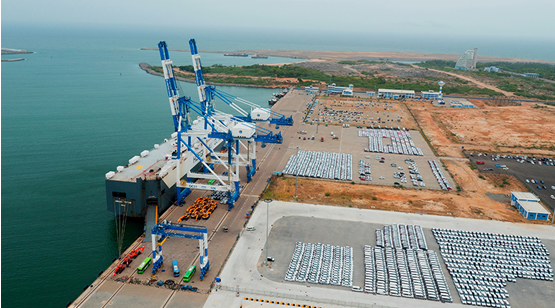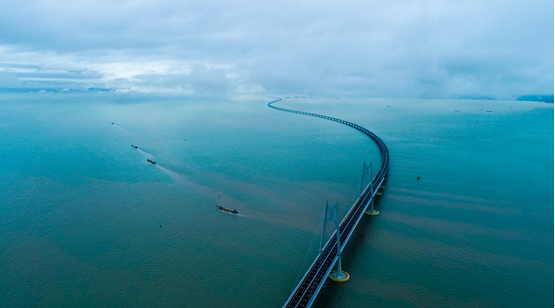


Photo shows the Hambantota Port in Sri Lanka. (Photo from website of China Harbour Engineering Company)
The 2019 World Ports Conference opened on May 8 in Guangzhou, capital of southern China’s Guangdong province, as port industry leaders gather to discuss common challenges and opportunities.
The conference was attended by representatives from more than 50 countries and regions, as well as deputies from enterprises and international organizations such as the World Bank.
Chinese enterprises have been actively expanding cooperation with ports in relevant countries since the Belt and Road Initiative (BRI) was proposed. Over the past six years, the Chinese port businesses played an active role in Belt and Road construction, and continuously deepened international collaboration.
By the end of 2018, China had taken part in the construction and operation of 42 ports in 34 countries, including Greek’s port of the Piraeus, the Hambantota Port in Sri Lanka and Pakistan’s Gwadar Port, building a maritime transportation network covering all coastal countries along the Belt and Road.
Doing business in more than 100 countries and regions, Chinese engineering contractor China Harbour Engineering Company (CHEC) has established more than 90 branches and offices across the world and is hiring more than 15,000 employees. So far, the contract value of projects under construction by CHEC has surpassed $30 billion.

China Harbour Engineering Company is the main contractor of the Hong Kong-Zhuhai-Macao Bridge, the world’s longest cross-sea bridge. (Photo from website of China Harbour Engineering Company)
As it becomes global under the BRI, the company has proactively combined its construction service capability with the urgent need of Belt and Road countries and regions to develop and improve their port facilities.
CHEC has built the Hambantota Port for Sri Lanka, the Doha New Port for Qatar, and the Port Abidjan Project in Ivory Coast, and provided integrated solutions for its global clients, said CHEC chairman Lin Yichong.
The company is currently building the Lekki Deep Sea Port in Nigeria. The project is a concessional build-own-operate-transfer contract, of which 45 years are for operations.
CHEC has invested $1.1 billion in phase one of the project which is designed to have a handling capacity of 1.2 million TEUs. The port will be the only large deep sea port in Nigeria that could accommodate Panamax ships, and is expected to greatly boost port logistics of Nigeria.
The port will have a 2,300-meter-long container wharf, one berth for bulk cargoes and three liquid berths, which make it one of the largest deep sea ports in West Africa. Adjacent to Lekki Free Trade Zone (FTZ), the port will help build the FTZ into an export-oriented special economic zone and it will be supported by the FTZ in its operation. Together, the two will be of vital significance for Nigeria’s economic growth.
Port construction and operation is opening a page of splendid stories of China’s international cooperation.
Capt K. Subramaniam, general manager of Port Klang Authority (PKA) of Malaysia, said China and Malaysia are jointly building a port at the Malaysia-China Kuantan Industrial Park. After construction, the port could hold 15 vessels, which will increase efficiency of raw materials and goods transportation, and boost Malaysia’s industrial development and exports.
“We’ve obtained land approval, and completed phase one construction of the port,” Subramaniam disclosed, adding that all the facilities are ready for operation and actually ships were seen at the port three months ago.
China is an important trading partner and source of investment for Indonesia. As early as 2016, Indonesian Port Corporation (IPC) started to cooperate with Chinese companies in marine transportation and trade. The company reaped profit growth of 2 to 6 percent per year from Belt and Road cooperation over the past three years, said Elyvn G. Masassya, President Director of IPC.
The BRI has not only boosted port economy of countries and regions along the route, but also helped solve problems these countries and regions are faced with.
Port of Gdansk is the largest port in Poland and one of the largest in Europe. The port was put under financial pressure as prices of commodities and transportation costs rose.
Thanks to the China Communications Construction Company (CCCC), which is operating container business for the port in Chinese city of Chengdu, Gdansk has embraced a major growth point, which is also a new opportunity for the company, said Sławomir Michalewski, Vice-President of Financial Affairs at the Port of Gdansk.
Chinese companies will follow the principle of wide consultation, joint contribution and shared benefits, deepen cooperation with Belt and Road countries and regions in port and shipping infrastructure construction, so as to strengthen maritime connectivity, expand new areas for cooperation such as ports, logistics and port-centered industries, and cement maritime cooperation, said Yuan Yue, deputy director of Guangzhou Port Authority.
 Fire brigade in Shanghai holds group wedding
Fire brigade in Shanghai holds group wedding Tourists enjoy ice sculptures in Datan Town, north China
Tourists enjoy ice sculptures in Datan Town, north China Sunset scenery of Dayan Pagoda in Xi'an
Sunset scenery of Dayan Pagoda in Xi'an Tourists have fun at scenic spot in Nanlong Town, NW China
Tourists have fun at scenic spot in Nanlong Town, NW China Harbin attracts tourists by making best use of ice in winter
Harbin attracts tourists by making best use of ice in winter In pics: FIS Alpine Ski Women's World Cup Slalom
In pics: FIS Alpine Ski Women's World Cup Slalom Black-necked cranes rest at reservoir in Lhunzhub County, Lhasa
Black-necked cranes rest at reservoir in Lhunzhub County, Lhasa China's FAST telescope will be available to foreign scientists in April
China's FAST telescope will be available to foreign scientists in April "She power" plays indispensable role in poverty alleviation
"She power" plays indispensable role in poverty alleviation Top 10 world news events of People's Daily in 2020
Top 10 world news events of People's Daily in 2020 Top 10 China news events of People's Daily in 2020
Top 10 China news events of People's Daily in 2020 Top 10 media buzzwords of 2020
Top 10 media buzzwords of 2020 Year-ender:10 major tourism stories of 2020
Year-ender:10 major tourism stories of 2020 No interference in Venezuelan issues
No interference in Venezuelan issues
 Biz prepares for trade spat
Biz prepares for trade spat
 Broadcasting Continent
Broadcasting Continent Australia wins Chinese CEOs as US loses
Australia wins Chinese CEOs as US loses